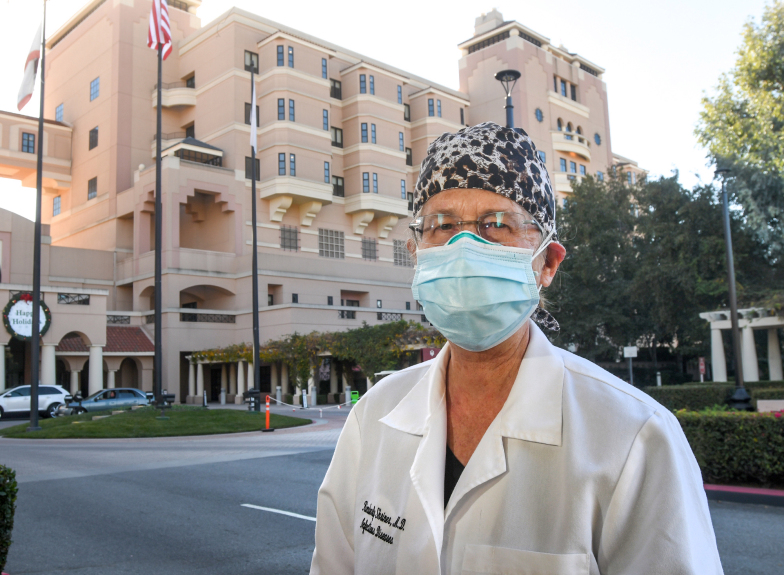Combining two cloth masks — or even better, a cloth mask over a KN95/N95 — could be the golden ticket as long as the fit is comfortable, snug and you can breathe.
By BRADLEY BERMONT | Pasadena Star-News
As new, more contagious variants of the coronavirus float around Southern California, doctors and scientists have started to recommend doubling-down on your mask game.
If your usual mask is thin, you should probably upgrade to something more substantive — a two-layer cloth mask with a filter pocket works great, but the widely available KN95 mask is even better. And an N95 mask, sometimes harder to get for the general public, is among the best options you can find.
But combining two cloth masks — or even better, a cloth mask over a KN95/N95 — could be the golden ticket as long as the fit is comfortable, snug and you can breathe.
That’s according to Dr. Kim Shriner, infectious disease specialist at Huntington Hospital, who echoed statements from scientists and doctors around the country. Many have started voicing support for double-masking, citing data that shows it can be substantively more effective at blocking virus particles.
“The principle of double-masking is simple,” Shriner said in an interview on Friday, Jan. 29. “You that many more barriers between you and the virus.”
Masks are effective because they create a “maze” of fibers that virus particles have to travel through, Shriner said. KN95 and N95 masks are designed with a dense fabric mesh to physically “trap molecules in the netting of the mask. That’s why they’re so effective.”
An N95 mask is more effective than a KN95, but the latter is more comfortable than the former.
“The most effective mask should be the one that’s closest to your face,” Shriner said.
Shriner didn’t recommend wearing two KN95s or N95s because the fit would likely be too bulky and the masks wouldn’t fit well. Pairing one of those masks with a cloth mask can fit more comfortably and will provide extra protection.
“But no mask is effective if you wear it below your nose,” Shriner said. “That’s defeating the purpose.”
Whatever you choose, it needs to fit well, but stay away from gators and bandanas, which “are not very good,” Shriner said, explaining that they may “cleave” the viral particles in two, potentially making it easier to spread.
She especially urged the public not to wear them in grocery stores “which is a rather perilous thing now,” given the still-elevated case rates and more contagious variants that are spreading.
“You want to pick a mask that fits well and that’s comfortable so you’ll actually wear it,” Shriner said.
She doesn’t think you need to be wearing two masks all the time — going for a walk, for instance — but when you’re taking essential trips to the grocery store, that’s when you want a few layers. Same for any visits to public places where people might be gathered, even if it’s outside.
While exercising, Shriner suggests having a mask around your neck so you can pull it up when other people are around. Personally, she wears a single KN95 while walking her dog and an N95 plus a cloth mask in grocery stores.
“It does get a little harder to breath with two masks,” Shriner said. “You don’t want to be so layered that you’re passing out.”
Alongside many of her colleagues, Shriner wears two masks while working at Huntington Hospital
“It’s very clear that good masking makes an enormous difference,” she said. “It’s such an inexpensive, safe way of preventing infection. How it got politicized is beyond me, but I hope it will fade away as people realize it’s the best way to protect themselves.”
There’s a growing body of research that has shown time and time again that masks reduce the likelihood of someone spreading the disease — some studies found an 80% reduction, according to the Centers for Disease Control — but more studies are emerging that show wearing a mask can also protect the wearer from breathing in viral particles, too.
N95 masks are particularly effective at protecting the wearer; KN95 masks are slightly less effective, but still much better than cloth masks.
Two face-hugging cloth masks stacked on top of one another can provide comparable protection, according to Dr. Linsey Marr, an expert in virus transmission at Virginia Tech and an author on a recent commentary laying out the science behind mask-wearing, who spoke to the New York Times.
Another option is to buy a face-hugging cloth mask with a filter pocket between the layers; Shriner recommended purchasing replaceable HEPA filters for these masks, not using vacuum filters or coffee filters “which aren’t all that effective,” she said.
Source: LA Daily News
